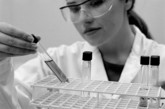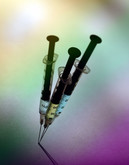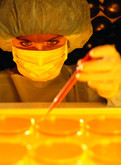Biosimilars/Research
FTC- Biosimilars to spur innovation and competitive prices
In the Journal of Generic Medicines (published online 8 September 2009), Michael Wroblewski and Elizabeth Jex of the US Federal Trade Commission (FTC) write about the promise of follow-on biologics (FOBs) to spur both biological drug innovation and competitive prices.
Time for a re-evaluation of ESAs
In an article in The New England Journal of Medicine (NEJM) by Ellis F Unger, Aliza M Thompson, Melanie J Blank, and Robert Temple, published on 6 January 2010 at NEJM.org, it is stated that it is time for a re-evaluation of erythropoiesis-stimulating agents (ESAs).
Modify Fc fucosylation and β-galactosylation for biobetter MAbs
In an article by Dr Claire Morgan and Dr Daryl Fernandes of Ludger, published in IPI of Autumn 2009, it is shown how both the original drug manufacturers and the designers of follow-on biologics could produce biobetter monoclonal antibodies (MAbs) through glycoengineering. (see also Ludger’s GTO-QbD: Defining glycovariant biobetter MAbs, When is a glycoengineered biobetter commercially better than a biosimilar? and Strategy and tools for building glycoengineered biobetter MAbs)
When is a glycoengineered biobetter commercially better than a biosimilar?
In an article by Dr Claire Morgan and Dr Daryl Fernandes of Ludger, published in IPI of Autumn 2009, it is shown how both the original drug manufacturers and the designers of follow-on biologics could produce biobetter monoclonal antibodies (MAbs) through glycoengineering. (see also Modify Fc fucosylation and β-galactosylation for biobetter MAbs, Design out NeuGc, Fab glycosylation for biobetter MAbs, Design out Gal-α(1,3)-Gal for biobetter MAbs, Strategy and tools for building glycoengineered biobetter MAbs and Ludger’s GTO-QbD: Defining glycovariant biobetter MAbs)
Design out NeuGc, Fab glycosylation for biobetter MAbs
In an article by Dr Claire Morgan and Dr Daryl Fernandes of Ludger, published in IPI of Autumn 2009, it is shown how both the original drug manufacturers and the designers of follow-on biologics could produce biobetter monoclonal antibodies (MAbs) through glycoengineering. (see also Ludger’s GTO-QbD: Defining glycovariant biobetter MAbs, When is a glycoengineered biobetter commercially better than a biosimilar? and Strategy and tools for building glycoengineered biobetter MAbs)
Design out Gal-α(1,3)-Gal for biobetter MAbs
In an article by Dr Claire Morgan and Dr Daryl Fernandes of Ludger, published in IPI of Autumn 2009, it is shown how both the original drug manufacturers and the designers of follow-on biologics could produce biobetter monoclonal antibodies (MAbs) through glycoengineering. (see also Ludger’s GTO-QbD: Defining glycovariant biobetter MAbs, When is a glycoengineered biobetter commercially better than a biosimilar? and Strategy and tools for building glycoengineered biobetter MAbs)
Strategy and tools for building glycoengineered biobetter MAbs
In an article by Dr Claire Morgan and Dr Daryl Fernandes of Ludger, published in IPI of Autumn 2009, it is shown how both the original drug manufacturers and the designers of follow-on biologics could produce biobetter monoclonal antibodies (MAbs) through glycoengineering. (see also Modify Fc fucosylation and β-galactosylation for biobetter MAbs, Design out NeuGc, Fab glycosylation for biobetter MAbs, Design out Gal-α(1,3)-Gal for biobetter MAbs, When is a glycoengineered biobetter commercially better than a biosimilar? and Ludger’s GTO-QbD: Defining glycovariant biobetter MAbs)
Ludger’s GTO-QbD: Defining glycovariant biobetter MAbs
One area of great interest to developers, copiers and improvers of therapeutic antibodies is glycosylation, since it can significantly influence the safety and efficacy profiles of the drug. In an article by Claire Morgan and Daryl Fernandes of Ludger published in IPI of Autumn 2009, it is shown how both the original drug manufacturers and the designers of follow-on biologics could produce biobetter antibodies through glycoengineering. In particular, they examine strategies for optimising both fragment antigen-binding (Fab) and fragment crystallisable (Fc) region glycosylation to produce monoclonal antibodies (MAbs) with improved clinical performance and better commercial profiles compared to existing drugs.
Why are there suddenly ‘biosimilars’ besides ‘biologicals’?
“Isn’t everything already complicated enough?” asked Professor Theo Dingermann of the Goethe University in Frankfurt, Germany, at the Weekend Workshop ‘Patient and Pharmaceutical Care’ of the German Union of Pharmacists Societies (Bundesvereinigung Deutscher Apothekerverbände, ABDA) held on 17–18 October 2009 in Hannover, Germany.
Biologicals and biosimilars: how can we afford them?
Demand for biological drugs is putting pressure on health budgets. Medical student, Mr Christopher Kelly and Consultant Physician, Dr Fraz Mir of the University of Cambridge, UK, examine in the British Medical Journal of 19 September 2009 why they are so expensive and what can be done to increase access.











